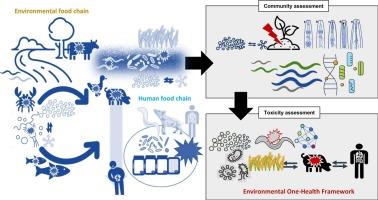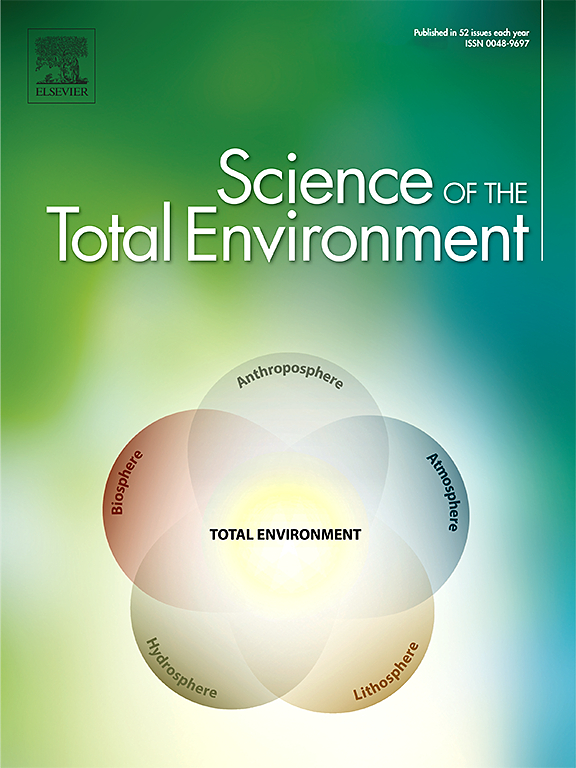土壤线虫暴露:揭示农业生态系统中颗粒塑料对健康的影响。
IF 8
1区 环境科学与生态学
Q1 ENVIRONMENTAL SCIENCES
引用次数: 0
摘要
塑料微粒在陆地生态系统中不断累积,需要采用创新的、了解生物学的方法来评估其对生态和人类健康的影响。土壤线虫作为评估土壤中塑料污染影响的敏感和生态相关的生物指标正在得到认可。它们的广泛分布、营养适应性以及与土壤颗粒的密切联系使它们成为检测对微和纳米塑料细微但重要的生物反应的理想哨兵。塑料污染会破坏土壤结构、微生物组成和养分循环,进而影响线虫的丰度、多样性和群落动态。在分子和组学技术的支持下,土壤线虫生物检测的最新进展为线虫暴露提供了新的见解,捕获了直接的颗粒相互作用,微生物转移和营养转移过程。我们提出了一个分层评估框架,利用线虫中的保守分子途径来预测与塑料暴露相关的环境和人类健康结果。通过将线虫生态指数与机制生物标志物相结合,该框架将风险评估转变为更全面、更有效和更具成本效益的模型。将线虫纳入塑料污染研究不仅提高了我们监测土壤生态系统健康的能力,而且在日益充斥塑料的食物链中,在保障农业可持续性和公众健康方面发挥着至关重要的作用。本文章由计算机程序翻译,如有差异,请以英文原文为准。

The soil nematode exposome: Unraveling the impacts of particulate plastics from agroecosystems to one health
The escalating accumulation of particulate plastics in terrestrial ecosystems demands innovative, biologically informed approaches to evaluate their ecological and human health impacts. Soil nematodes are gaining recognition as sensitive and ecologically relevant bioindicators for assessing the effects of plastic pollution in soils. Their widespread distribution, trophic adaptability, and close association with soil particles make them ideal sentinels for detecting subtle yet significant biological responses to micro- and nanoplastics. Plastic contamination can disrupt soil structure, microbiome composition, and nutrient cycling, which in turn affects nematode abundance, diversity, and community dynamics. Recent advancements in soil nematode-based bioassays, bolstered by molecular and omics technologies, offer novel insights into the nematode exposome, capturing direct particle interactions, microbial shifts, and trophic transfer processes. We propose a tiered assessment framework that leverages conserved molecular pathways in nematodes to predict both environmental and human health outcomes associated with plastic exposure. By integrating nematode ecological indices with mechanistic biomarkers, this framework transforms risk assessment into a more holistic, efficient, and cost-effective model. Incorporating nematodes into plastic pollution studies not only enhances our capacity to monitor soil ecosystem health but also plays a crucial role in safeguarding agricultural sustainability and public health in an increasingly plastic-laden food chain.
求助全文
通过发布文献求助,成功后即可免费获取论文全文。
去求助
来源期刊

Science of the Total Environment
环境科学-环境科学
CiteScore
17.60
自引率
10.20%
发文量
8726
审稿时长
2.4 months
期刊介绍:
The Science of the Total Environment is an international journal dedicated to scientific research on the environment and its interaction with humanity. It covers a wide range of disciplines and seeks to publish innovative, hypothesis-driven, and impactful research that explores the entire environment, including the atmosphere, lithosphere, hydrosphere, biosphere, and anthroposphere.
The journal's updated Aims & Scope emphasizes the importance of interdisciplinary environmental research with broad impact. Priority is given to studies that advance fundamental understanding and explore the interconnectedness of multiple environmental spheres. Field studies are preferred, while laboratory experiments must demonstrate significant methodological advancements or mechanistic insights with direct relevance to the environment.
 求助内容:
求助内容: 应助结果提醒方式:
应助结果提醒方式:


